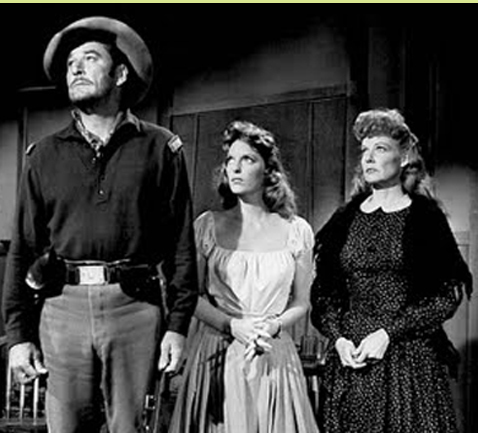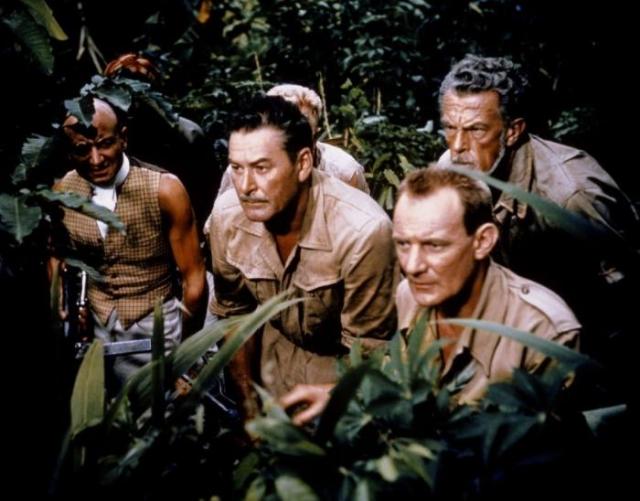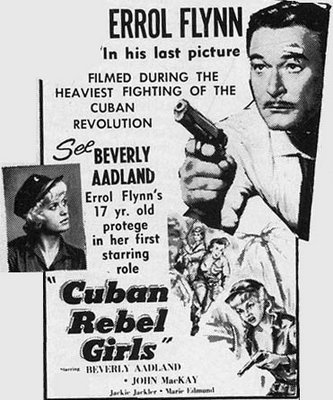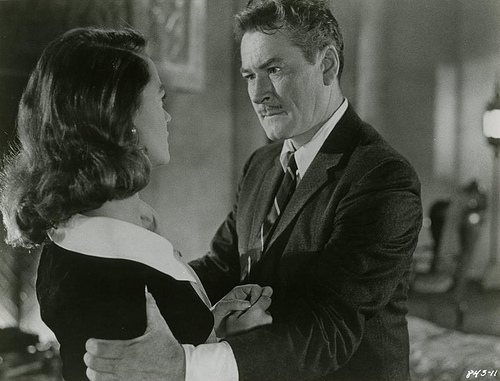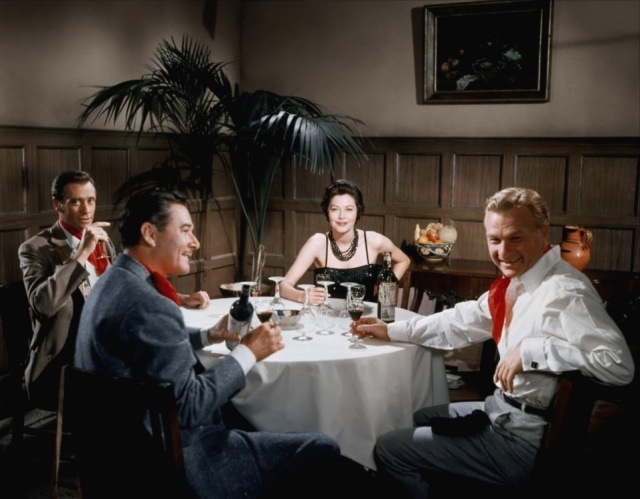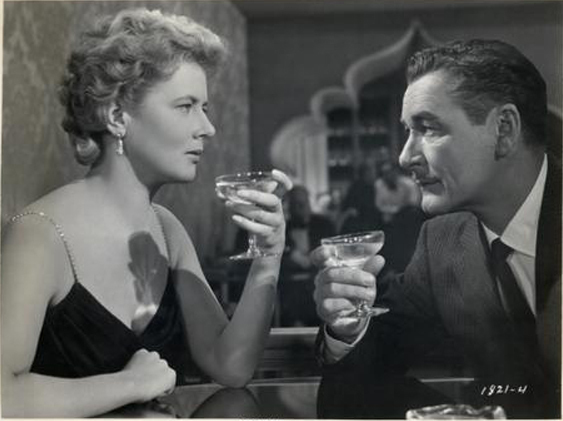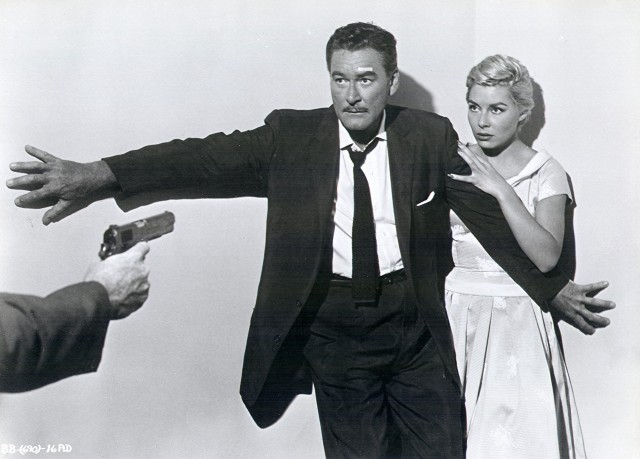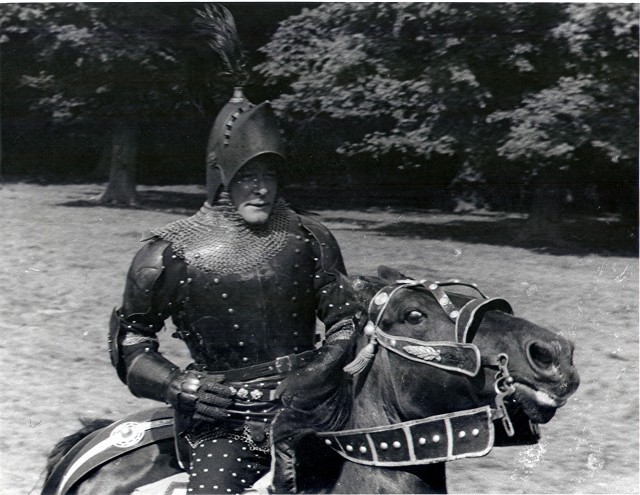Flynn: A Touch of Color in a Prosaic World
Posted by moirafinne June 24, 2009/ MovieMorlocks.com… – TCM
“Maybe all that I am in this world and all that I have been and done comes down to nothing more than being a touch of color in a prosaic world. Even that is something.” ~ Errol Flynn, writing in My Wicked, Wicked Ways.
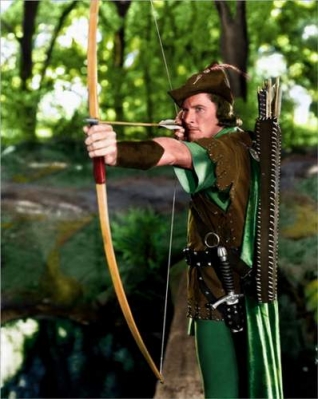
Well, no. It can’t be possible. Errol Flynn at 100 is unimaginable. Yet, as of Saturday, June 20th, the great swashbuckler of the sound era passed the one hundredth anniversary of his birth in 1909 in Tasmania. It may seem impossible that such a milestone has been reached without a bigger celebration in Flynn’s adopted homeland of America. However, ask yourself: For true classic movie fans, haven’t we continued to celebrate and rediscover Errol Flynn and his evergreen films over and over in the years since he left this world?
In his fifty years on earth, Flynn the wandering movie star who sailed the seven seas on screen and off, visited civil wars and cannibals, became a thief of hearts and diamonds, fathered four children in three marriages, seemed determined to set out in a fatalistic nose dive toward oblivion for much of his adult life. He lived as much as a dozen other men, even if half of his lively exaggerations in his memoirs are true. He left those of us who only knew him in movies breathless with the exuberance and zest he showed in his many dashing roles, such as Captain Blood (1935), The Adventures of Robin Hood (1938) and The Sea Hawk (1940). In a few, such as The Dawn Patrol (1938), Edge of Darkness (1943), and the little known Uncertain Glory (1944), he impressed with his too often hidden, introspective side, (something that sings out from some of his writing and accounts of the rather quiet father recalled by his children, of whom, Rory and Deidre Flynn are still living).
He brought a poignant, tattered gallantry and even some dignity to flawed films such as The Sun Also Rises (1957), The Roots of Heaven (1957) and Too Much, Too Soon (1958), after he’d become a shadow of his former athletic self. The rollicking boy was gone for good, but something a bit darker and occasionally deeper was left in his place. Despite the abuse that showed on his face, there seemed to be an actor looking for some self-respect too. That hardworking, caring artist can occasionally be glimpsed inside the falling movie star and world-class roisterer. This is especially clear when he had a chance to play his friend, mentor and boon companion in the dissipation sweepstakes, John Barrymore, in Too Much, Too Soon, based on the tragic Diana Barrymore’s scandalous memoir. When he came closest to creating a memorable Hemingway character etched in alcohol on screen, playing Mike Campbell quite brilliantly in an misbegotten version of The Sun Also Rises, he was said to have been a serious candidate for a Best Supporting Actor Oscar nomination. Despite good critical notices and praise from his peers in private, no prestigious public award was ever to come his way.
_________________________
Errol Flynn was often better than he would admit to himself, especially in his earlier movies. Feeling miscast in many films, (particularly Westerns, in which his accent and posh manner is continuously being explained away as Irish or Australian). The miscasting and typecasting made him feel trapped, but he believed that he could not get out of his contract, claiming that “this was impossible to point out to producers when the pictures were so highly successful. It was most frustrating, it stopped my trying to act…I walked through my roles…My heart wasn’t in it, only my limbs.”
Often at odds with his most effective director, Michael Curtiz, who guided him through such blockbusters as Robin Hood and eleven other films, (a relationship that may have been complicated by the fact that Flynn’s first wife, actress Lili Damita, was also an ex-wife of the director Michael Curtiz), Flynn sought to forge a stronger creative alliance with a more compatible Raoul Walsh, with whom he made They Died With Their Boots On (1941) and Gentleman Jim (1942), and seven other movies.
Despite his own disparagement of his roles, he is also one of the reasons why classic movies still speak to people to this day. Some of us can trace our love for movies directly to him and his movies.
“Living I have done, enormously, like a gourmand eating the world, and I don’t suppose it is egotism, but only fact, to suggest that few others alive in the present century have taken into their maw more of the world than I. On the sea, beneath it, in the air, and in all the parts of most of the lands, I have gone a-hunting n quest neither of fame nor of fortune, but the vindication of the act of living.” ~ Flynn, laying it on a bit thick in My Wicked, Wicked Ways
Making just over 60 films and television appearances, the thought of of him brings alive memories of Flynn as the personification of the recklessness of youth, boyish mischief, the spirit of adventure and the simple, unalloyed joy in breathing. Thank goodness it was captured on film for a time, even though it couldn’t possibly last within one gifted person for very long on earth. Acting may have been his best known professional activity, but a sailor, a man with a serious interest in marine biology (his father was a very well known professor), he also had revolutionary sympathies and ambitions as a journalist, plantation owner and hotelier, as well as a film producer. He found, unfortunately, that he was only well paid for the acting.
Errol Flynn’s Tasmanian birthplace of Hobart in Australia had the good sense to honor their most famous former resident in the days leading up to what would have been his hundredth birthday. Whether he liked it or not, the community that he left at age 18–where he was already well known as a sketchy character from a well known family, celebrated his life and career with a ten day festival.
The Errol Flynn Centenary celebration came after many years when the community (and Flynn) seemed to express mixed feelings about their native son. Though the man looked back on himself as “a devil in boy’s clothing” in the period when he lived there, the events during the festival featured memorabilia being presented at a local museum by Rory Flynn, the unveiling of a plaque at the State Theater where Errol watched silent films as a boy, and a galaxy of his movies on display in the local movie house.
Most of these were corkers like those mentioned earlier in this piece, reflecting a love of colorful “Olde Englande” and a lingering anglophilia for the Empire in status-mad Hollywood between the wars, such as The Charge of the Light Brigade (1936). One film, the leaden Adventures of Don Juan (1948) was also included, which a bloated and sad Flynn made very near the end of his brightest days at Warner, filled with his fading enthusiasm for the swashbuckling genre on display, along with the unfortunate double-entendres that began to show up in his scripts following the well-known statutory rape trial he endured in 1943, (for the record, he was acquitted). From this time, his public image seems to have pained him more than a little, though an underlying nihilism and devil-may-care air masked this much of the time, publicly. Negative publicity was compounded with his inability to serve in the military thanks to serious health issues at odds with the heroic mold he was cast in at Warners. His disenchantment with acting, and a possible, strong and unenviable case of satyriasis seems to have plagued him, attracting more temptation thanks to his movie fame, despite period flings with monogamy.
Btw, some biographies imply that the publicity department at Warner Brothers was responsible for claiming Irish birth for Flynn. Other sources indicate that, for all his iconoclastic personal history, as an ambitious young actor trying to make a rapid transition from a colonial subject to an actor in British repertory and then to a place in the Hollywood sun, Hibernian roots may have sounded much more appealing to his primary American audience. That audience, whose sense of geography was considered too rudimentary to grasp the concept of an Australian actor, soon took to him after the fortuitous casting–it should be noted–by Flynn’s studio nemesis and boss, Jack Warner (or so he claimed in his autobiography). Even Centenary Festival Guest of Honor, the actor’s daughter, Rory Flynn, the author of The Baron of Mulholland, (who can be heard speaking at length about her photo memoir and her impressions of her father), said that her Dad never mentioned Hobart or Tasmania to her. One of the drives behind her attendance is a chance to connect with her family roots. Speaking of her journey there, Ms. Flynn characterized it as a “pilgrimage” and “reconciliation [that] has been a long time coming.” Though she said that her dad never returned to his birthplace, she expressed the belief that “He didn’t get a chance to, but I think he would have come back if he had lived long enough.” Some of the attendees repeat stories they grew up hearing about his misadventures, but one of the people who “came out of the woodwork” to discuss the Errol Flynn she knew was ninety-nine-year-old Ila Andrews. Describing him as a fine tennis player, and “no worse than the boys nowadays”, Ms. Andrews remembered fondly that “he was a naughty boy here and there.”
Somewhere, I hope that Errol Flynn might be chuckling a bit. Two other events also took place during the festival week , both of which I suspect might have appealed to the actor, who was also a great animal lover. One was the naming of a small creature who is one of an endangered species, an actual Tasmanian Devil at Bonorong Wildlife Park on the island of Tasmania after Rory Flynn’s father in the hopes that “Little Errol”, the Tasmanian Devil prone to a form of cancer, might spur donations to the campaign to help the animals survive. You can also read up more about the environmental and physical problems faced by the creature.
The other incident that occurred at the same festival was one that I would like to think that Flynn might find a bit funny. One of the modest honors accorded to one of Australia’s most famous native sons is still controversial, even one hundred hectic years after his birth. Despite the presence of Ms. Flynn and her son and Errol’s grandson, 19-year old Sean, and the enthusiasm of the Hobart City Council for the celebration, the state government is not nearly as enchanted with remembering their famous former resident.
<!–[endif]–>In 2003, according to news reports in the Australian media, the council named a dog park Errol Flynn Reserve. The state, however, has declined to follow through, in part because some residents still cannot overlook Tasmania’s famous son’s flaws. Some residents opposed even this small, but appropriate honor for Flynn, a lifelong dog fancier, (seen above in Hollywood with a loyal pal. Flynn’s attachment to his canines was such that a decade and a half after the event, the actor was reported close to tears recalling his pet Arno, who was drowned when he was swept off the deck of his master’s boat, the Sirocco into the Pacific). According to Bob Casey, an Australian author of Errol Flynn and the Sword of Fate, a book about Flynn’s ties to Australia, explained that the board was set against Flynn because a “large percentage of the residents told the board that Errol Flynn should not be given any recognition because he was a womanising drug user, along with the rest of it, who was a disreputable person.” One hopes that the world wide attention paid to the positive heritage Flynn left the world might eventually outweigh any lingering prejudice against “the naughty, naughty boy”, now half a century gone from the scene.
In Errol Flynn’s well-written, if occasionally far-fetched books, the boyish fictionalized adventure Beam Ends, his 1937 picaresque novel chronicling a fictionalized account of his early adventures in the South Seas, and My Wicked, Wicked Ways, a memoir he wrote mostly for money just before his end in 1959, I was impressed with his surprisingly vivid prose. Both books are filled with the exuberant voice of a man who kept his constant, wearying quest for experience of all types alive as long as he could, though self-disgust and world-weariness come through near the end of the latter book. In that, he describes one particular encounter, not with a nubile young woman, but with a fan confined to a wheelchair. Stopping him as he left a theater, Flynn was deeply embarrased that she wanted to tell him how much happiness he had given her. “I walked off thinking, Maybe I haven’t been such a loss after all. Anybody who can bring a few moments of happiness to another human life certainly can’t be wasting his time in an otherwise fear-ridden and very often drab world. Maybe it hasn’t all been so futile. Maybe it wasn’t all a waste.”
The lithe, jaunty figure who can be seen in an uncharacteristic moment singing and dancing in the wartime musical, Thank Your Lucky Stars (1943) is inconceivable as one who might ever be bowed with age. And, of course, thanks to the fact that the man had almost every gift but self-restraint and longevity, he wore himself out by fifty, a very old fifty. When his inevitable early death came at a time when he was still trying “to find himself”. Thank goodness for us that the movies captured something. Here is a moment, with Flynn answering some of those unspoken questions we all might ask as he sings the refrain “I can see the question in your eyes, I can see the twitching of your ears. Now it’s not to be repeated, but gentlemen be seated, and I’ll tell you where I’ve been for all these years…I was out on the blue Pacific…”
— Tina
